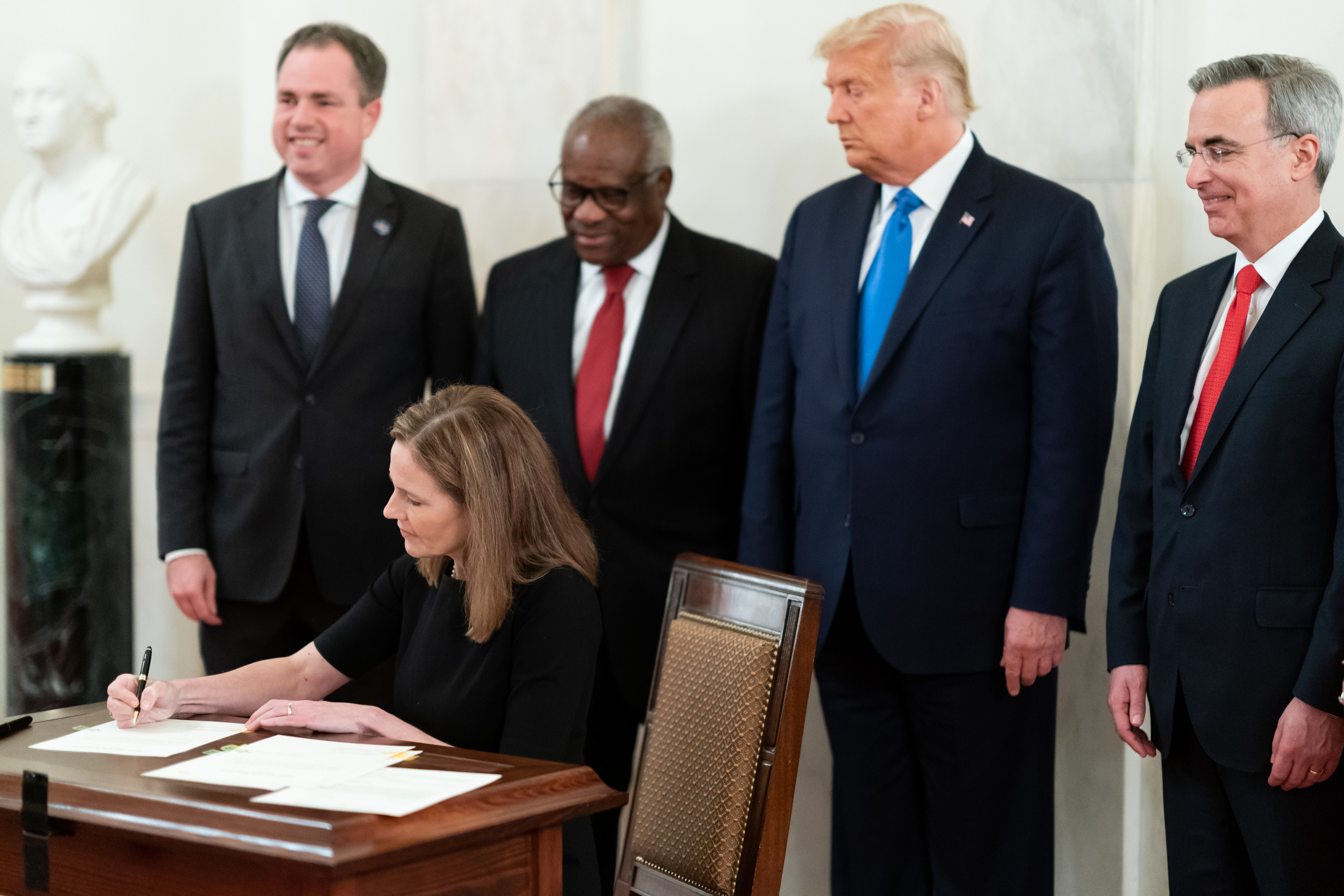On the 26th of October, Judge Amy Coney Barrett was confirmed to the Supreme Court, filling the seat of the recently deceased Ruth Bader Ginsburg. The 52-48 vote saw none of the Democrats voting for and only one Republican voting against. The first Supreme Court judge voted in without a single vote from a minority party. Conservatives have now cemented their already existing majority on the Supreme Court with 6 of the 9 seats filled by Republicans. [1]
The absence of Democrat votes comes as no surprise to anyone. They have been vocal in their disapproval of the rushed confirmation, which comes only 8 days before the Presidential election. Democrats, including Senate Minority Leader Chuck Schumer have been calling out the Republicans’ hypocrisy [2], referring to 2016, when 9 months before the election, a seat on the Supreme Court opened up and Senate Majority Leader Mitch McConnell blocked former President Obama’s nomination because it was an election year. His argument was that “American people are perfectly capable of having their say on this issue, so let’s give them a voice. Let’s let the American people decide. The Senate will appropriately revisit the matter when it considers the qualifications of the nominee the next president nominates, whoever that might be ». [3]
Overturning Roe v. Wade?
Perhaps the biggest controversy surrounding Amy Coney Barrett’s nomination is her anti-abortion views and the possibility that Roe v. Wade might be overturned.
Roe V. Wade is a landmark Supreme Court decision, that in 1973 legalized the access to abortion for all women in the US. In 1969, Norma McCorvey, then a pregnant 21-year-old took federal action against Henry Wade the district attorney of Dallas county, Texas, under the pseudonym “Jane Roe”. The lawsuit alleged that the abortion laws in Texas were unconstitutional. The case was then appealed to the Supreme Court and ended in a historic ruling for abortion rights in the US [4].
During her confirmation hearing, Amy Coney Barrett played it coy when Senator Feinstein asked if she, like her mentor Justice Scalia, believed that we should overturn Roe v. Wade. She said that she refused to pre-commit to approaching a case in any particular way, a stark contrast with Ruth Bader Ginsburg’s straightforward answer when she was asked the question of abortion at her hearing 27 years earlier: “the decision whether or not to bear a child is central to a woman’s life, to her well-being and dignity. It is a decision she must make for herself. When Government controls that decision for her, she is being treated as less than a fully adult human responsible for her own choices.” [5]

Amy Coney Barrett’s past shows a track record of advocating against abortion. In 2006, she signed an advertisement in The South Bend Tribune by an extreme anti-choice organization, the “St Joseph County Right to Life group” that pleaded for the overturning of Roe v. Wade and called it “barbaric”. [6] Amy Coney Barrett has said in the past that she doesn’t believe Roe v. Wade will be able to get overturned, but that there could be restrictions.
Many are worried about what abortion restrictions could mean for in vitro fertilisation (IVF): Amy Coney Barrett’s beliefs that life begins at fertilization mean that physicians performing IVF could be put at risk for criminal violations. Damaging an embryo who is now recognized as a legal person could be categorized as manslaughter.
The new Supreme Court judge is set to vote on an abortion case in the next few weeks that could potentially reverse Roe v. Wade in Mississippi. [7]
The future of Obamacare
There are concerns about what her nomination could mean for the Affordable Care Act (ACA ; Obamacare). Republicans have previously unsuccessfully tried to repeal ACA 70 times. [8] Ever since Trump took office, he made it clear that repealing and replacing Obamacare was one of his top priorities. While in her hearing she tried to stay impartial on the ACA subject, we can assume that Amy Coney Barrett was chosen by Trump for her political views and when it comes to it she will vote with the conservatives.

The Supreme Court is set to start hearings on November 10 on the latest attempt to repeal the ACA [9]. In the next few weeks, Amy Coney Barrett’s voting decisions could give us a glimpse of the future of the now overwhelmingly conservative Supreme Court. Along with the abortion and ACA votes, Amy Coney Barrett will also vote on whether or not to enforce the Manhattan’s District Attorney Office subpoena on Trump’s taxes. [10]





Laisser un commentaire
Vous devez vous connecter pour publier un commentaire.